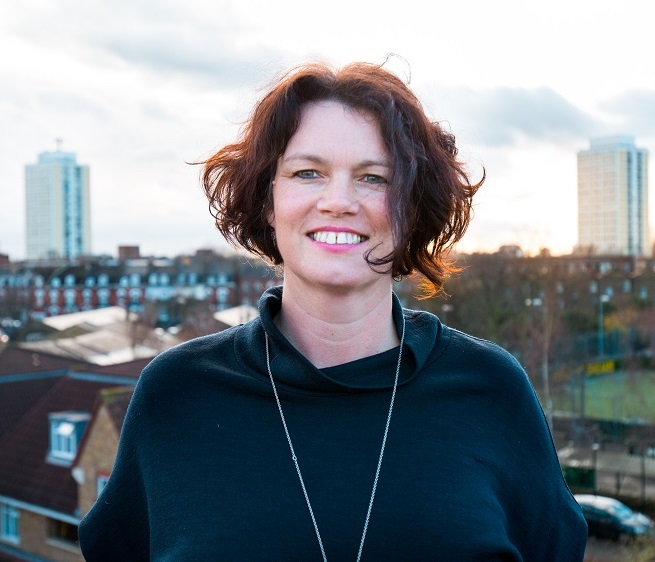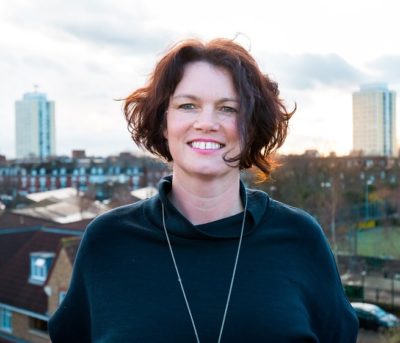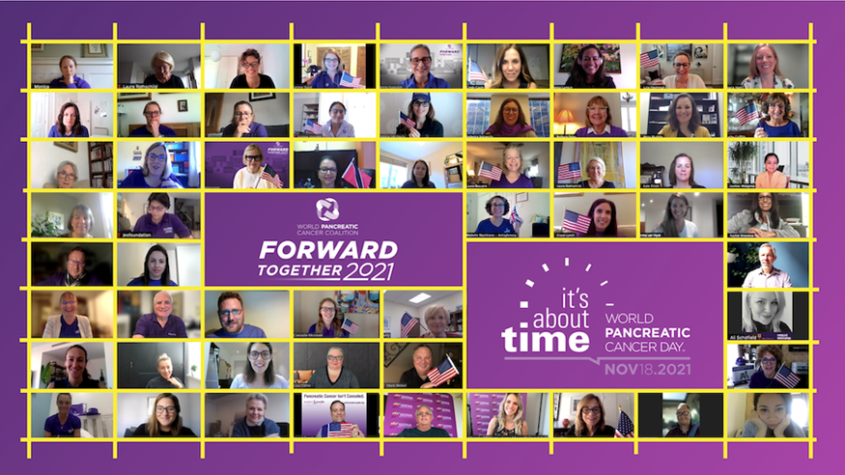

Bringing the global community together
As a member of the World Pancreatic Cancer Coalition committee, it was a pleasure to co-chair the World Pancreatic Cancer Coalition annual meeting this year.
A Blog by Diana Jupp, our Chief Executive
The event was postponed entirely last year due to the pandemic, so it was great to be back, albeit with virtual sessions instead of meeting in person. The workshops held across the two time zones meant we could bring together pancreatic cancer patient advocacy groups and charities from around the world, to continue with our key aims; learning about emerging pancreatic cancer science, enabling the sharing of information and best practices and continuing to raise awareness of the disease.

One of my highlights from the conference was the fascinating discussion from the Scientific Panel that took place on day one. Moderator Barbara Keener, PhD was joined by Dr. Elizabeth M. Jaffee and Dr. Anirban Maitra to discuss issues around early detection of pancreatic cancer and innovations on the horizon. The full discussion can be seen here.
On day three, we heard from Bryony Thomas, a pancreatic cancer survivor and an incredibly valued and passionate supporter of Pancreatic Cancer UK. She brought the key issues to life by sharing her personal story of the disease – not a dry eye was left in the room. You can view her powerful account here, although we’d like to warn viewers it is a personal account that some may find upsetting.
The conference also shared the plans for World Pancreatic Cancer Day, promoting a united message for all coalition members to use on the 18th November in order to raise awareness of the symptoms and risks of the disease. This particular session can be viewed here.
The main focus of this event, however, was to narrow in on 3 key topic areas and the biggest challenges those areas face. We brainstormed across the international community to find workable solutions that would transform the future for those affected by the disease.
What are the biggest issues across the 3 key topic areas?
Diet and nutrition – Diet is not made a priority when treating people with pancreatic cancer and patients are not getting access to a dietitian as often as they should. There is a lack of awareness amongst health care professionals, particularly in non-specialist settings, about how the pancreas works and how diet and nutrition and enzyme replacement therapy can have a huge effect on survival – often improving quality of life to the same degree as treatment.
Molecular profiling – Different molecular profiling technologies are used to look at the genetic make-up of both patients and their tumours in order to identify mutations (changes in their DNA). This information can then be used to help diagnose and tailor treatments for each patient depending on the types of mutation they have. Molecular profiling isn’t widely known about. Patients find out after a diagnosis they could have taken a test and that certain mutations are specifically linked to pancreatic cancer. Testing across the global health care landscape is inconsistent, when it should be considered routine. Education for both the public and health care professionals needs to take place, alongside discussions around ethics, funding and the sharing of best practice.
Clinical trials – It was recognised that clinical trials are not being accessed as easily and often as they should be. There is no global directory of where and when these are taking place making them difficult to locate, particularly for disadvantaged populations. The lack of visibility and understanding also leads to mistrust and clouded opinions of how they operate.
How might the ideas be taken forward?
It was fantastic to see so many big ideas coming out of the discussions. There is now a real opportunity for every country to take some of these key ideas, work as a coalition and make them a reality:
- Patient empowerment
Patient empowerment was a huge theme throughout the discussions at the conference; patient education, clear resources, and having more in-depth conversations with health care professionals. It was also recognised that more funding should be made available so they have better access to health specialists, more treatment options, and health insurance.
- Education for health care professionals
Health care professionals need greater education around all 3 key themes and the coalition can work together to help ensure diet and nutrition, molecular testing and clinical trials are all better understood within the community.
- Raising awareness
There were three campaign ideas that the World Pancreatic Cancer Day committee could potentially take forward and explore for future global awareness campaigns, including a focus on the pancreas itself and helping to educate people on the molecular testing and clinical trials.
- Improving resources
An important outcome of the diet and nutrition discussion was to improve information resources into multiple languages around this subject, which is something the coalition could work together to provide. This expanded to other areas with some big discussions around a molecular profiling audit which would enable us to understand what was happening in each country and see a worldwide picture, as well as creating a portal of all the open and rolling clinical trials across the world.
Pancreatic Cancer UK is very proud to be part of bringing the global community together and will continue to drive forward these changes both in the UK and internationally. Only by working together can we learn from each other and improve outcomes for everyone.
You can find all of the links to the recordings of the sessions below:
2021 WPCC Annual Meeting – Day 1 – Welcome & Update
2021 WPCC Annual Meeting – Day 1 – Science Panel
2021 WPCC Annual Meeting – Day 3 – WPCD Campaign Preview
2021 WPCC Annual Meeting – Day 3 – please be advised this is a personal account of Bryony’s experience of pancreatic cancer which some viewers may find upsetting – Bryony Thomas
2021 WPCC Annual Meeting – Day 3 – Breakout Session Reports